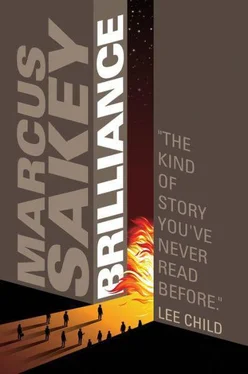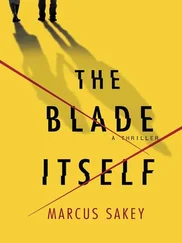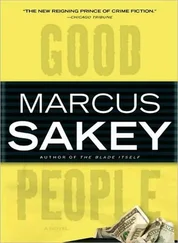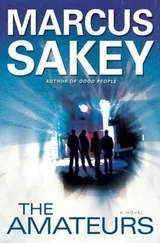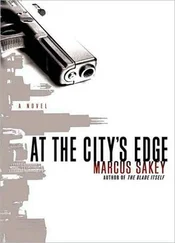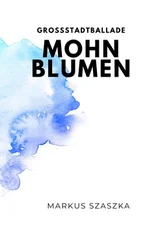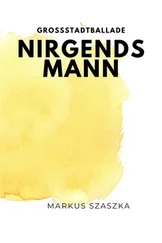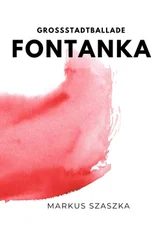“…breathe, just breathe…”
“…my husband, where is…”
“…it hurts, God, it hurts …”
Cooper took a deep inhale, felt tings and stabs of pain as his chest swelled. Nothing too bad. He raised his right hand and gingerly patted the back of his head. The flesh was hot and swollen and sore, the hair sticky. He must have hit it. How?
Slowly, he rolled onto one side, then swung his legs off the edge of the cot. Also military, he noticed. This was an army triage tent. For a moment the world swam. He clamped down on the edge of the cot with both hands. The pain came now, a whirling thumping, dull and looming.
“Go slow.”
Cooper raised his head and opened his eyes. A trim man in scrubs spattered with blood stood beside him. Where had he come from?
“How did I get here?”
“Someone must have brought you. What hurts?”
“My—” He coughed. His throat was full of dust. “My head.”
“Look at this?” The doctor had a penlight out. Cooper obediently stared into it, followed as the man moved it back and forth. A triage center, he was in a triage center of some sort. But how? He remembered fighting through the crowd, the surging, roiling chaos of all those people. Stalked by two o’clock when…the bombs. He had been trying to stop bombs from going off. He had seen—
“ Where is she? ” Cooper whipped his head around, felt the pain as a promissory note, ignored it for now. He was in a large field tent packed with rows of cots, the beds nearly touching. Men and women in scrubs pushed across the rows, speaking insistently to one another as they tended the wounded. Maybe twenty racks in here, he couldn’t see all of them, she could be in one.
“Hey.” The doctor’s voice was firm. “Look at me.”
The pain paid what it owed, a crushing feeling like there was a vise in the middle of his skull. Cooper groaned, looked back at the doctor. “Where is she?”
“I don’t know who you’re talking about,” the man said, fitting a stethoscope to his ears, “but I’m sure she’s fine. Right now I need you to relax so I can see how badly hurt you are.”
It all clicked together, finally, the scattered pieces coalescing into a whole. He had been chasing John Smith’s agent, the woman who could walk through walls, the cell phone bomber with the big eyes. He had caught up with her inside the Exchange. But not in time.
“How bad is it?” Cooper felt like something was falling through his chest.
“That’s what I’m checking. Deep breath.”
Cooper did as he was told, the air rattling in his lungs. “Not me. I mean. How bad is it?”
“Oh. Deep breath.” The doctor stared into the distance as he listened to Cooper’s chest. Whatever he heard seemed to satisfy him. “I don’t know how to answer that.”
“How many people…”
“I’m focused on the ones in front of me.” The doctor looped the scope around his neck and glanced at his watch. “You have a mild concussion. There was a lot of smoke and dust inhalation, but nothing I’m worried about long-term. You’re very lucky. You should avoid sleep for a while, eight, ten hours maybe. If you start to feel dizzy or nauseous, go to the hospital immediately.” He started away.
“Wait. That’s it?”
“You can stay if you feel weak, but if you think you can walk, we could really use the space.”
“I can walk.” Cooper took a deep breath and a look around. “Can I help you?”
“Do you have medical training?”
“Basic first aid.”
The doctor shook his head. “Too many people trying to help already. Best thing you can do right now is get out of the way.” And then he was gone, on to the next cot.
Cooper sat on the edge of the rack for a moment, letting his whirling thoughts slowly die down. Collecting himself, rebuilding the memories. He’d had her, hadn’t he? Slapped her cell phone away, had cuffs in hand. He’d won. He’d caught the bad guy. Girl.
And yet, this.
He took a long breath that made him cough until he tasted dust on the back of his tongue. Then he stood up. If the bombs had gone off, there would be victims far worse off than he seemed to be. Best to clear the cot.
He looked in the other beds before he left, but she wasn’t there.
Moving slowly to keep the pain from splashing around his skull, Cooper walked to the exit, pushed the canvas door flap aside, and stepped outside.
Into a graveyard.
For a moment he thought he was hallucinating.
The sky had been replaced by a thick gray scrim of whirling dust. The air tasted charred. In the dim light, trees were skeleton-limbed silhouettes, pointing like Charon across the river to the underworld. And all around him were tombstones. Marble tombstones inscribed with names and dates.
Cooper reached out to touch the tent, pinching the material between fingers scraped and sore. It was covered in a thin layer of dust, but had the tight, satisfyingly tactile touch of canvas. This was real. It was happening. So then, the graves…
Trinity Church. This is the churchyard. Alexander Hamilton is buried here somewhere.
It made sense. In crowded Manhattan, space for triage tents would be in short supply. Still. There was an ugly symbolism. He had fallen asleep in one world and awakened in another. The first had been sunlight and fanfare; this one was dust and ash.
There were people all around. Some of them seemed to be part of the organized rescue effort. They carried stretchers and shuttled medical supplies and directed ambulances in a busy dance. But many others seemed dazed. They stood and stared, looked up at the towering spire of the church, or back toward Wall Street, where the smoke thickened.
Wall Street. The Exchange. Maybe she was still there.
Cooper started through the cemetery. His head hurt and his body was sore, but more than anything he just felt thick, altered. Like a guy driving home, singing along with the radio right up until the semi T-boned him and sent the car end over horrifying end, the world spinning, flashes of colors, sky, ground, sky, ground, and then the impact, the sickening crunch, and in that instant, when the world had shifted completely, when everything that had mattered a moment before no longer even rated, the radio would still be playing the same song.
He felt like the song.
Slowly, he picked his way through the churchyard. He climbed the low fence to Broadway, crossed the street where food trucks had blocked his path. Someone bumped him, their shoulder hitting hard, and the novelty of that struck him. He hadn’t been bumped like that in a long time. The world was water; nothing was permanent, all was shift and change. A cop started to wave him back, but Cooper felt through his pockets, found his badge. The man let him pass. The smoke was thicker, and he couldn’t see more than ten, fifteen feet. Beyond that the best he could do was make out flashing colors, police lights. He moved toward them. People staggered the other way, their faces dirty, clothes torn, expressions shocked. They leaned on one another. Soldiers carried stretchers.
Cooper walked, slow and steady, four-four time in a world gone off measure.
Every step stranger. The bones of buildings had torn through their stone skin and lay exposed. Collapsed walls buried the cobblestones. Shattered glass dusted the scene with razor-edged glitter. The dust clouds were lit brighter by a dozen fires burning out of sight. He reached the corner where he had spotted the woman who could walk through walls. Firemen dug through the rubble, masks on their faces and reflective stripes on their uniforms.
To the south, he could see the New York Stock Exchange, a building that had stood for a hundred years, weathered depressions and wars and unimaginable social change, been a symbol for the unstoppable power of capitalism until that power was, indeed, stopped by the arrival of his kind; a building that had, ever so briefly, represented the hopes of a world struggling for a new balance when every conviction had been upended, every fact proved unstable, every belief turned fragile; a building of stone and steel that by its simple presence declared that the engines that powered the world were running fine. It was in ruins.
Читать дальше
